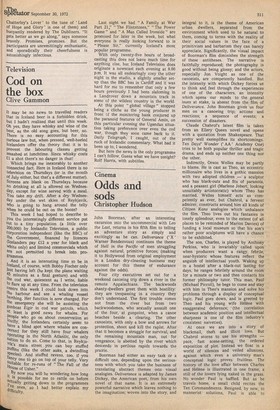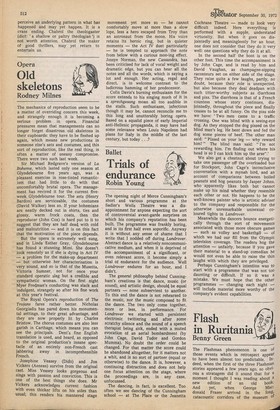Odds and sods
Christopher Hudson
John Boorman, after an interesting excursion into the uncommercial with Leo the Last, returns in his fifth, film to telling an adventure story as simply and excitingly as he can. Deliverance (` X ' Warner Rendezvous) continues the theme of Hell in the Pacific of men struggling against natural, primitive forces; (making it to Hollywood from original employment in a London dry-cleaning business may account for this theme of endurance against the odds).
Four city executives set out for a weekend canoeing trip down a river in the remote Appalachians. The backwoods shanty-dwellers greet them with hostility: they are trespassing in a country they don't understand. The first trouble comes not from the river but from two backwoodsmen, who sexually assault one of the four, at gunpoint, when a canoe beaches beside a clearing. The other canoeists, with only a bow and arrows for protection, shoot and kill the rapist. After that it becomes a struggle for survival, and the remaining mountain man, out for vengeance, is abetted by the river which descends in perilous rapids towards the prairie.
Boorman had either an easy task or a difficult one, depending upon the seriousness with which you take the business of translating abstract themes into visual analogies. Deliverance is adapted by James Dickey, the American poet, from his own novel of that name. It is an extremely powerful narrative which leaves nothing to the imagination; woven into the story, and integral to it, is the theme of American urban dwellers, separated from the environment which used to be natural to them, coming to terms with the reality of their social values in the face of a primitivism and barbarism they can barely appreciate. Significantly, the visual impact of Boorman's film diminishes the strength of these antitheses. The narrative is faithfully reproduced; the photography is good without being glossy; and the actors, especially Jon Voight as one of the canoeists, are competently handled. But the intensity with which Dickey forces us to think and, feel through the experiences of one of the characters, an intensity which opens our minds to the general isues at stake, is absent from the film of Deliverance. John Boorman gives us four men on a canoeing trip; actions and reactions; a sequence of events; a succession of disasters.
Claude Chabrol's latest film is taken from an Ellery Queen novel and opens with a quotation from Shakespeare. That pretty well exemplifies its shortcomings. Ten Days' Wonder (' AA' Academy One) tries to be both popular thriller and tragic drama, and ends up neither one thing nor the other.
Indirectly, Orson Welles may be partly to blame. He is cast as Theo, an eccentric millionaire who lives in a gothic mansion with two adopted children a sculptor who has black-outs and fits of paranoia, and a peasant girl (Marlene Jobert, looking unsuitably artistocratic) whom Theo has married. Welles himself acts as com petently as ever, but Chabrol, a fervent admirer, constructs around him all kinds of Citizen Kane analogies which unbalance the film. Theo lives out his fantasies in lonely splendour, even to the extent (of all places to be reminded of Marion Davies) of funding a local museum so that his son's rather poor sculptures will have a chance to be exhibited.
The son, Charles, is played by Anthony Perkins, who is invariably called upon when producers want a rangy, febrile, near-hysteric whose features reflect the anguish of intellectual youth. Waking up in a hostel after a black-out lasting for days, he ranges febrilely around the room for a minute or two and then contacts his former philosophy tutor. This man, Paul (Michael Piccoli), he begs to come and stay with him in Theo's mansion and solve his problems through a display of conceptual logic. Paul goes down, and is greeted by Theo and his young wife Helene with exaggerated deference; ' (the correlation between academic position and intellectual sharpness is one of the film industry's consistent naiveties).
At once we are into a story of blackmail, theft and illicit love. But Chabrol scorns to use his strengths — pace, fast scene-setting, the ordered exposition of plot. Instead we float in a world of silences and veiled allusions, against which even a university man's conceptual logic proves fruitless. The history of the love affair between Charles and Helene is illustrated in one frame, a still of the lovers lying naked in the grass.
No wonder Paul is baffled. But as he travels home, a small child recites the Ten Commandments. Resigned, by now, to mannerist solutions, Paul is able to
perceive an underlying pattern in what has happened and may yet happen. It is a crass ending. Chabrol the theologaster (dict: 'a shallow or paltry theologian ') is not worth attention. Chabrol the maker of good thrillers, may yet return to entertain us.











































 Previous page
Previous page